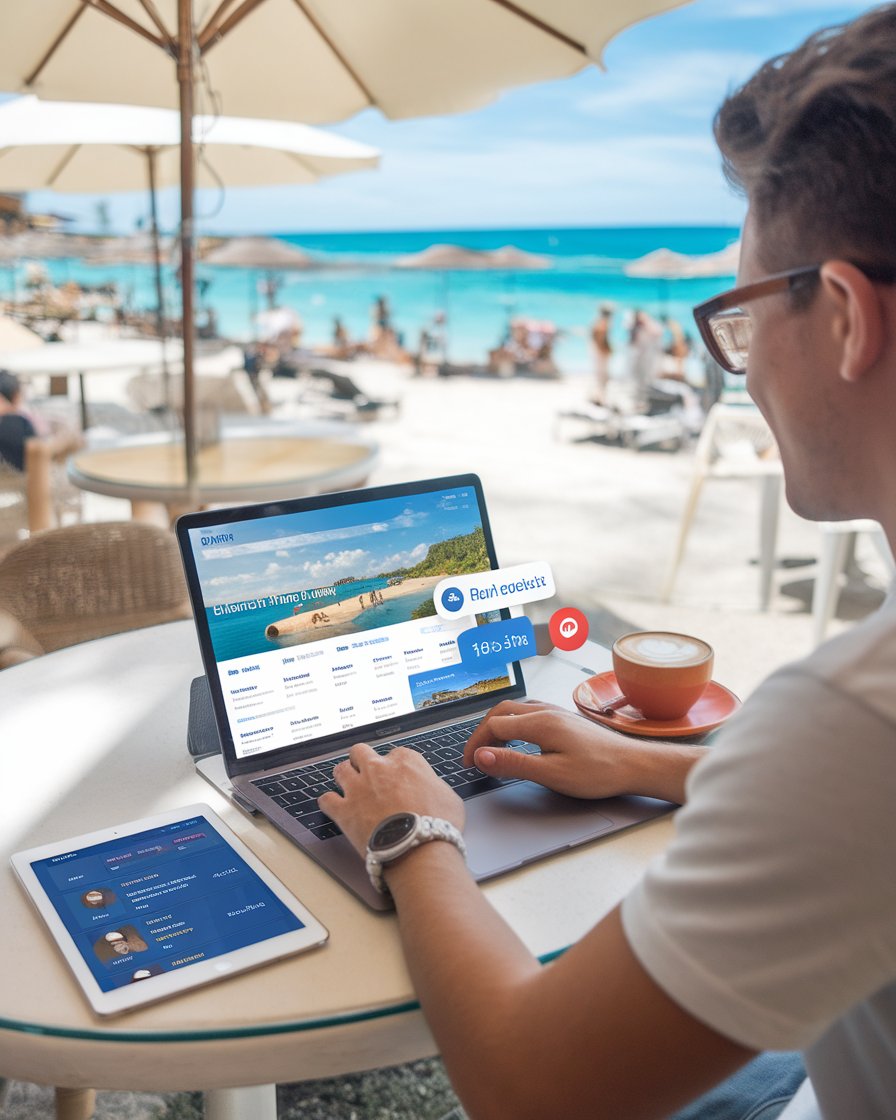Introduction
Starting an online travel agency business can be an exciting and profitable venture, especially in today’s growing travel industry. With more people booking trips online, the need for user-friendly travel websites has become increasingly important. To launch a successful business, you’ll need to follow a structured step-by-step guide. This involves registering your business, obtaining the necessary permits, and setting up essential travel agency software to ensure smooth operations. You’ll also need to focus on customer experience, offering diverse travel experiences and using a reliable OTA market to meet their needs.
To stand out, your travel business should integrate a one-stop-shop for customers, allowing them to book flights, hotels, and tours seamlessly. Partnering with tour operators and utilizing platforms like Kayak can enhance your offerings. A well-developed travel agency business plan and strategic use of tools like invoices will ensure that your business runs efficiently from day one.
Key Takeaways
- Starting an online travel agency business requires registering your business, defining a niche, and obtaining the necessary permits.
- Integrating a user-friendly booking engine and reliable travel APIs ensures seamless customer experiences and prevents overbooking.
- Conduct thorough market research to understand your target audience and tailor services to meet customer demands.
- Utilizing GDS platforms like Sabre or Amadeus allows access to travel suppliers’ real-time inventory.
- Offering specialized niche travel services can set your business apart in the competitive OTA market.
- Leverage technology platforms to provide real-time availability, secure payments, and enhance the overall customer experience.
Steps to Start an Online Travel Agency: A Comprehensive Guide
Starting an online travel agency involves several crucial steps. First, you’ll need to register your business and obtain necessary licenses and permits to operate legally. Next, define your niche—whether it’s adventure travel, luxury vacations, or corporate travel—to cater to a specific target audience. Conduct thorough market research to understand the current trends in the travel industry and identify your ideal customers. A business plan that outlines your financial goals, services offered, and marketing strategies is essential for success. Integrating a user-friendly booking engine and payment gateway into your website will allow seamless transactions for customers. Focus on creating a unique customer experience by offering travel experiences that meet their needs, ensuring they can search and book travel effortlessly.
Key Steps to Building a Successful Online Travel Agency (OTA)
1. Register Your Business and Obtain Necessary Licenses To operate legally, you must register your business and acquire licenses based on your region’s regulations. Ensure compliance with local authorities to avoid future legal challenges.
2. Define Your Niche Specializing in a particular area, such as luxury or adventure travel, will help you target specific customers and stand out from larger competitors. Conduct market research to identify the best niche for your business.
3. Build a User-Friendly Travel Website Your travel website should have intuitive navigation, a secure payment gateway, and an integrated booking system that allows users to book flights, hotels, or tours easily.
4. Integrate Reliable Travel APIs and GDS To prevent overbooking, use travel APIs and Global Distribution Systems (GDS) like Amadeus or Sabre. These systems provide real-time data and enhance the customer experience by offering up-to-date availability and pricing.
5. Implement a Strong Marketing Strategy Develop a digital marketing strategy that includes SEO, social media, and email campaigns to attract customers and build your brand presence in the competitive OTA market.
Registering Your Business and Obtaining Necessary Permits
The first step in launching your online travel agency is registering your business with the appropriate government agencies. This includes choosing a legal structure, such as an LLC or corporation, and acquiring the necessary licenses and permits. Different regions have specific regulations, so it’s essential to research local requirements. Ensuring compliance from the start helps avoid legal issues in the future. Additionally, setting up a merchant account for payment processing allows you to accept customer payments securely. Having these foundational elements in place ensures your travel agency operates smoothly, allowing you to focus on growing your customer base.
Defining Your Niche and Target Market
Identifying your niche is crucial for attracting the right customers to your online travel agency. Whether it’s adventure travel, luxury vacations, or corporate bookings, focusing on a niche allows you to specialize and stand out from the competition. Conducting market research helps you understand the needs and preferences of your target audience, allowing you to offer tailored travel products and services. Specializing in a specific area also enables you to create unique travel experiences that appeal directly to your target market. By establishing a clear focus, your agency can carve out a competitive advantage in the vast travel industry.
Choosing the Right Booking Engine and Travel API Integration
Selecting the right booking engine is essential for the smooth functioning of your online travel agency. A good booking engine enables customers to book flights, hotels, and other travel services in one place. It’s important to integrate reliable travel APIs that provide real-time data on availability and pricing from travel suppliers. This integration will prevent issues like overbooking or double-booking and allow your customers to make informed decisions about their travel options. Additionally, integrating a GDS (Global Distribution System) like Amadeus or Sabre is beneficial, especially when dealing with flights, hotels, or car rentals. The right combination of technology ensures your business runs smoothly, offers a seamless customer experience, and helps you stay competitive in the growing online travel market.
Case Study: The Role of Amadeus and Sabre API Integration in Streamlining OTA Operations
A travel startup specializing in adventure tours needed to integrate a robust booking engine that could handle multiple services like flights, hotels, and car rentals. They chose Amadeus API for its wide range of travel content, including access to over 400 airlines, 150,000 hotels, and car rental options. By integrating the Amadeus GDS, they streamlined their bookings, offering customers real-time pricing, availability, and a seamless booking experience.
However, when the company expanded into the luxury travel segment, they needed additional features for personalization. This led to the integration of Sabre API, which provided better customization tools for flight and hotel bookings, including access to mileage options and branded fares. The combination of both APIs significantly enhanced their operations, reduced overbooking, and improved customer satisfaction by providing real-time data and a smooth booking process.
Importance of Real-Time Availability and Pricing
When running an online travel agency, offering real-time availability and pricing is key to customer satisfaction. Integrating reliable travel APIs into your booking engine allows you to provide up-to-date information on flights, hotels, car rentals, and other services. Customers can easily search and book travel knowing that the data they’re seeing is accurate. This reduces the chances of overbooking or double-booking, a common issue when working with multiple suppliers. Providing real-time information not only improves the customer experience but also builds trust in your brand.
Preventing Overbooking with GDS and APIs
Integrating a Global Distribution System (GDS) and travel APIs is a must for any online travel agency dealing with a large volume of bookings. GDS platforms like Sabre or Amadeus connect you with airlines, hotels, and car rental companies, giving you access to their inventory. This ensures you have real-time data on availability, preventing issues like overbooking. APIs can help integrate this data into your booking engine seamlessly, ensuring that your customers can book travel without worrying about reservation errors. Offering a smooth booking process enhances customer trust and helps you avoid potential financial losses.
Understanding the Benefits of Starting an Online Travel Agency
Starting an online travel agency offers various benefits, especially as more people rely on online platforms to book travel. One major advantage is the flexibility to operate from anywhere, eliminating the need for a physical office. Additionally, online travel agencies (OTAs) can cater to a global audience, expanding your customer base beyond local clients. With the use of technology platforms, like booking engines and payment gateways, the process of planning and booking travel becomes seamless for customers. Offering personalized travel experiences tailored to niche markets, such as adventure travel or luxury vacations, allows OTAs to stand out in the competitive travel market. As the online travel industry is expected to grow, starting your own OTA presents a promising business opportunity.
Flexibility in Managing an Online Business
One of the biggest advantages of running an online travel agency is the flexibility it offers. Without the need for a physical office, you can operate your business from anywhere, reducing overhead costs. This flexibility also extends to your customers, who can search and book travel at any time, from any location. As long as you have access to a reliable internet connection and the necessary travel tools like a booking engine and payment gateway, managing bookings, interacting with customers, and updating your offerings is seamless. This convenience is one of the reasons why online travel agencies continue to thrive in the digital age.
Expanding Your Customer Reach Globally
Online travel agencies have the advantage of reaching a global audience. Unlike traditional travel agencies, which rely on local foot traffic, OTAs can cater to customers from around the world. This opens up new opportunities to offer travel products and experiences to a diverse clientele. By utilizing marketing strategies such as email marketing, search engine optimization (SEO), and social media, you can attract customers from various regions. The ability to operate 24/7 means your services are always available, providing convenience for travelers across different time zones.
“Global access to customers changes who buys from us and how. It can also change what products and services we provide.” — Teryl Celeste ( Teryl Celeste )
How to Navigate the Competitive OTA Travel Market
The online travel market is highly competitive, with big brands like Expedia, Booking.com, and TripAdvisor leading the way. To successfully navigate this space, it’s essential to offer a unique value proposition to differentiate your agency from others. Targeting a niche market, whether it’s eco-tourism, budget travel, or group tours, can give you a competitive edge. Use data from market research to tailor your services to meet customer demands and ensure you’re providing excellent customer service. Offering loyalty programs, personalized recommendations, and a seamless booking experience can help your agency stand out. Additionally, staying up-to-date with industry trends and integrating user-friendly features like mobile apps and fast payment gateways can enhance customer satisfaction and boost your business’s growth.
Leveraging Technology to Enhance Customer Experience
In a highly competitive market, using advanced technology to enhance the customer experience is essential. A user-friendly website and mobile app can make booking travel easier for your customers. Integrating seamless payment gateways, offering personalized travel recommendations, and using AI-driven chatbots for customer support are just a few ways technology can boost customer satisfaction. Keeping your travel agency website updated with new travel products and experiences ensures that customers can always find what they need. Leveraging technology also allows you to gather customer feedback, which can be used to further improve your services.
Standing Out with Niche Travel Services
To stand out in the crowded online travel market, offering niche travel services can make all the difference. Focusing on niche markets, such as eco-tourism or luxury travel, allows you to target a specific audience that larger OTAs may overlook. By offering personalized travel experiences tailored to these markets, you can create a strong brand identity. Specializing in niche travel not only sets your business apart from competitors but also allows you to build a loyal customer base that values the unique experiences you provide. This strategy can help your OTA thrive in a competitive environment.
[lasso rel=”amazon-29″ id=”10216″]
Conclusion
To successfully register your online travel agency and build a successful online travel agency, it’s essential to follow the necessary steps, from obtaining licenses to integrating reliable travel booking systems. By defining your niche and offering tailored travel experiences to your customers, your business can stand out in the competitive market. Collaborating with host agencies and using advanced technologies will ensure your operations run seamlessly while meeting customer needs.
As the travel industry continues to become increasingly popular, adopting a strong comprehensive marketing strategy will help attract the right audience. Platforms like brands like Booking.com and insights according to Phocuswright can guide you in making data-driven decisions. Focusing on customer satisfaction by answering frequently asked questions and maintaining a high level of service ensures that your agency will thrive in this fast-evolving industry.














